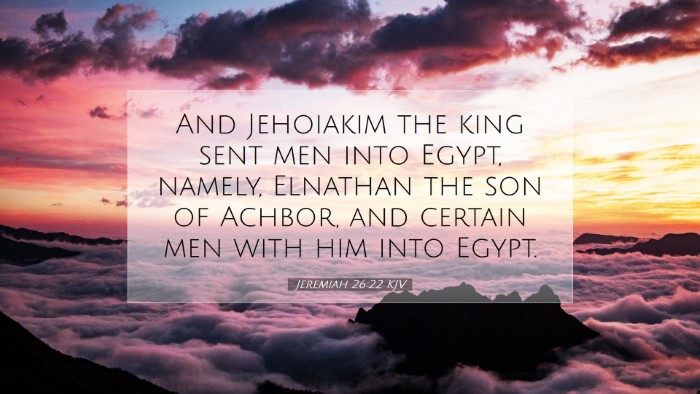Bible Commentary on Jeremiah 26:22
Verse: "And Jehoiakim the king sent men to Egypt, (to) fetch Uriah out of Egypt." - Jeremiah 26:22 (KJV)
Introduction
The verse in Jeremiah 26:22 serves a critical role in understanding the socio-political dynamics of Judah during the prophet Jeremiah's ministry. In the context of prophetic resistance, this verse illustrates the lengths to which King Jehoiakim would go to suppress divine truth and maintain his reign. This commentary draws upon insights from established public domain commentaries, including those of Matthew Henry, Albert Barnes, and Adam Clarke, to provide a thorough examination of this pivotal moment.
Contextual Background
To fully grasp the implications of Jeremiah 26:22, one must consider the historical backdrop of the events surrounding it. Jehoiakim, the king of Judah, was noted for his rebellion against the prophetic voice and the moral decline in Israel during his reign. Jeremiah, serving as a prophet during this tumultuous period, often found his messages of warning in direct conflict with the monarchy.
Matthew Henry's Commentary emphasizes the significance of prophetic ministry and the threats such ministries faced from corrupt political regimes. Henry highlights how Jehoiakim's actions reflect a broader disdain for God's messengers and the stark consequences of turning away from divine wisdom.
Analysis of Jeremiah 26:22
This verse marks a moment of extreme dishonor and tragedy as it speaks to an urgent attempt to silence the prophetic voices that stood against the actions of Jehoiakim. Albert Barnes, in his commentary, outlines the political motives behind Jehoiakim's decision to send men to Egypt to fetch Uriah. He notes that Uriah's prophecies, which mirrored Jeremiah's warnings, posed a credible threat by calling out Judah’s apostasy and impending judgment.
In doing so, Jehoiakim's actions reveal a desperate response of authoritarian power against divine truths, illuminating a recurring theme in scriptural narratives—the struggle between God's will and human authority.
Theological Implications
The theological implications of this verse extend deeply into themes surrounding divine sovereignty and human disobedience. Adam Clarke's commentary provides extensive insights on the idea that God’s prophecies are often met with human resistance, yet they ultimately prevail. Clarke argues that while Jehoiakim may seem to have control over his circumstances, it is God who ultimately orchestrates the events of history.
- Divine Sovereignty: The actions of Jehoiakim serve as a commentary on the futility of attempting to thwart God's plans.
- Prophetic Integrity: The verse underscores the challenge prophets face as they bear witness to truths that counter prevailing powers.
- Moral Courage: Uriah’s situation evokes a call for believers to demonstrate courage in the face of systemic injustice.
Lessons for Today
Reflecting upon Jeremiah 26:22 provides valuable lessons for modern-day believers and church leaders. It emphasizes the importance of standing firm in the face of adversity and the necessity of proclaiming God's truth even when it invites persecution.
As pastors and theologians study this passage, they are encouraged to draw parallels to contemporary societal issues where prophetic voices are still marginalized. Matthew Henry noted that those who speak the truth frequently encounter resistance, yet their faithfulness can lead others back to God. This is an essential calling for all members of the ministry today.
Conclusion
Jeremiah 26:22 serves not only as a historical account but as a timeless reminder of the ongoing struggle between divine authority and human governance. By examining the insights from Matthew Henry, Albert Barnes, and Adam Clarke, we gain a multi-faceted understanding of the complexities surrounding this text. It challenges readers to ponder their own response to God's directives in a world that often resists divine truth. The call remains for courage, integrity, and unwavering faithfulness in the proclamation of God's word.


